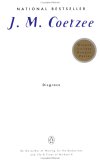Page 1 of 1
There are currently 3 reader reviews for Disgrace
Write your own review!
Mr. Naval Langa
The Graceful Disgrace
A flower starts journey from the dust. The dust is sex for the disgaced David. The master craftman Mr. J. M. Coetzee transforms him into a full grown, aromatic flower at the end of the novel. It hardly matters it got Booker. It is one of the books of our century.
The language beside lucid is acidic. It entertains on one hand and pulls our ears to behave on another. Why David is disgraced? He was well for one year sex relation with a whore. Yes, it was a consented relationship. When a man behaves oppressively with a woman he must be punished. That's what Cotzee has established.
But his daughter's accceptance of the reality, in a strange way to bear a child of the neo-oppressor, reveals how women are adusting naturally to the changed environment. One who is ignorant of South Africa's present may not be able to swallow the tough pill. We, in India, see such incidences of women's oppression day in and day out. Especially in rural flock.
Ashley
This book was great. We were allowed to choose from an array of postcolonial novels in my english course and I chose this one. I have minimal complaints, and those would be that the ending was obscure and unrelated. A minor theme becomes the prominent idea towards the end and I didn't enjoy the connection. Other than that, Coetzee is a genius. If you like this book you should read The Life and Times of Micheal K, it is WONDERFUL.
 Cloggie Downunder
unappealing
Cloggie Downunder
unappealing
Disgrace is the eighth stand-alone novel by award-winning author, J.M.Coetzee. After a short-lived, impulsive affair with a student, Romance poetry teacher, David Lurie resigns his position at Cape Town Technical University and retreats to his daughter’s farm in the South African countryside. They live in relative harmony until an attack leaves them feeling violated and fearful. Lurie returns to Cape Town to work on an opera he is composing about the poet Byron and his lover Teresa. As Coetzee narrates the recent events of Lurie’s life if the face of the changing political landscape of South Africa, he examines a range of topics: aging, lesbianism, a male’s contribution in sex, violence and violation, rape, humiliation, the price to be paid to be permitted to remain peacefully in a land reclaimed by its owners, freedom of speech, freedom to remain silent, power relations and sexual relations. Lurie’s refusal to pay lip service to convention’s demands highlights the inflexible and occasionally ridiculous nature of the system. His daughter tells him, “….surely you know by now that the trials are not about principles, they are about how well you put yourself across.” While there is some excellent prose: “The skull, followed by the temperament: the two hardest parts of the body.” and “The language he draws on with such aplomb is, if he only knew it, tired, friable, eaten from inside as if by termites. Only monosyllables can still be relied on, and not even all of them.”, the writing style is not particularly pleasing and the characters are unappealing and often irritating. I read this book after having read The Childhood of Jesus, which has been predicted to win Coetzee another Booker, to see if I liked it any better than that one. A Man Booker prize winner this one may be, but it confirms for me that I need read no more Coetzee.
